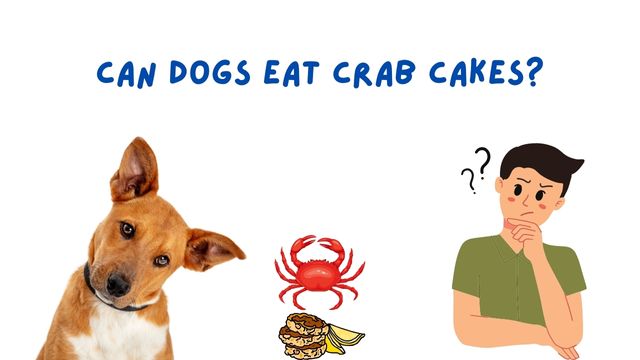Crab cakes are one of the most popular foods in the United States, and with good cause. They are tasty, crispy, and add a bit of zing to a monotonous diet. What’s more? They are easy to make at home – their ingredients are readily available, and there are literally tons of recipes that you can follow online.
But with cooking and eating crab cakes at home comes one risk – your dog can end up eating one when you’re not watching. After all, dogs have been known to eat a variety of random things, some of which aren’t even food. I mean, these cute pets even eat retainers and earbuds – two of the most bacteria-full objects. Such foreign objects can easily block your dog’s gastrointestinal tract and cause a myriad of other health issues.
But can dogs safely eat crab cakes? And if not, why is this the case? Well, that’s what we’re going to talk about today. By the time you’re done reading this post, you’ll know everything you need to know about crab cakes and dogs.

Are crab cakes safe for dogs to eat?
No, crab cakes aren’t safe for dogs, even though they can be safe for other pets. However, plain forms of cooked crab meat are safe and even good for dogs to eat – they contain some helpful nutrients. Ensure you don’t let your dog eat any raw crabs or those that have been cooked with their shells/legs, though. The former is particularly known to contain intestinal parasites that can upset your dog’s stomach and make them sick.
On the other hand, the latter is a choking hazard – it can easily get stuck in your dog’s throat and even cause cuts. Keep in mind, though – even if you shell and cook crab meat, there are still a few risks associated with offering it to your dog. The major one is that overindulgence can lead to obesity, high blood pressure, and bloating, especially among puppies. This is because crab meat has high cholesterol and sodium levels.
So if your dog is already struggling with high cholesterol and other health issues, avoid crab meat or only offer it as a treat. And if you’re offering it for the first time, start with small bits and take things slowly. Also, monitor your dog for any allergy symptoms after feeding them the crab meat. Some symptoms to look out for are coughing, itchiness, lethargy, watery eyes, and gastrointestinal issues.
What makes a crab cake unhealthy for dogs to eat?
Crab cakes are unhealthy for dogs because they contain spices and ingredients that can be harmful to dogs. These include oil, mayonnaise, and mustard. While the first two are fatty and can contribute to obesity, the last one can be toxic to dogs. This means that your dog also can’t eat crab rangoons – these deep-fried treats even contain onions and garlic, both of which are toxic to dogs.
So if you want to feed your dog crab meat, offer only that which is plainly cooked. Baked crab meat is a particularly great option – it’s tasty, easy to cook, and doesn’t need any butter or spices. Whatever you do, though, don’t cook imitation or canned crab meat for your dog. Canned crab meat contains preservatives that have been linked to the occurrence of cancer in dogs and other animals.
On the other hand, imitation crab isn’t even made of real crab meat – it’s made of white fish meat known as surimi that has been deboned and minced. To make matters worse, imitation crab contains a food coloring called Carmine that is made from bugs that can make your dog sick. Other problematic ingredients in imitation crab are potassium chloride and disodium inosinate. While the former can make your dog bloated, the latter can cause panting, sweating, tightness around the chest, burning sensation around the mouth, and difficulty breathing.
What should I do if my dog ate a crab cake?
If your dog accidentally eats crab cake, the first thing you need to do is monitor them for any signs of illness. If you notice any, take your dog to the vet, especially if the symptoms are getting worse with time. While the symptoms could go away on their own once the crab cake leaves your dog’s digestive system, it’s better not to take chances. Whatever the case, make sure that your dog never eats crab cakes again – repetitive ingestion will only make things worse.
If your dog loves crab meat and isn’t allergic to it, just bake or boil some with no other additive, not even salt. This will maintain your crab’s nutrients. These include Omega-3 fatty acids, minerals, proteins, and vitamins. The Omega-3 fatty acids are particularly good at boosting your dog’s immunity, reducing inflammation, and protecting its organs.
On the other hand, the minerals zinc and phosphorus regulate your dog’s metabolism and help it develop healthy joints, ligaments, and bones. Magnesium is also a useful mineral for dogs – it helps your pet’s body absorb other minerals and vitamins better. The Vitamin B12 present in crabs also encourages your dog’s brain to function healthily. Ultimately, occasionally feeding your dog cooked crab can make it healthier and happier.
Conclusion
If you constantly ask yourself if dogs can eat crab cakes, we’re here to tell you that they can’t, no matter how you cook the cakes. While the ingredients in these tasty delicacies can’t harm humans and several other animals, they are toxic to dogs. So if you must feed your dog some crab meat, always opt for shell-less and plainly cooked options – these can actually improve your dog’s health if offered in the right portions. After all, your dog’s health is way more important than any new culinary adventure you aim to embark them on.

